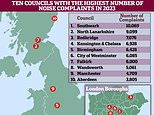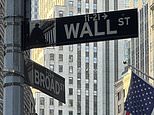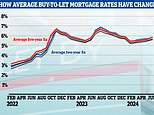There ARE reasons to be cheerful, reveals legendary City editor ALEX BRUMMER. A global market crash might be coming... and we're safer than most
As Labour moves to implement its 'growth' agenda there will be one overarching thought guiding Rachel Reeves. As a former Bank of England economist, she recognises more than most that the formidable power of the bond market vigilantes – investors looking to bully errant governments for their own gain – has to be her lodestar.
Indeed, if Liz Truss and her Chancellor Kwasi Kwarteng had recognised this two years ago, it is entirely possible that Keir Starmer and Reeves might still be on the opposition benches.
Market-driven economic catastrophes are rarely forgiven by the electorate, especially if they sharply raise the cost of consumer borrowing and mortgages.
Reeves' determination to hold the line on more public borrowing and ballooning debt and the mantra that all manifesto pledges have to be 'funded and costed' is no accident.
This is the stark financial lesson that France and the US should bear in mind amid their current election fever.

As Donald Trump's star rises in the opinion polls, amid the horror about Joe Biden's stumbling mental capacity, US bond markets are being jogged out of complacency

The prospect of an administration backed by Marine Le Pen with a neophyte 28-year-old prime minister Jordan Bardella has sent shivers through the European bond markets
France's Far Right National Rally party may believe that the Eurozone will provide a safety net whatever happens when the votes in second-round Parliamentary elections start to be counted tonight.
As a result it believes the country can avert a Truss tantrum. There is no such guarantee, as the people of Greece who went through a ghastly period of austerity after the debt implosion of 2008-10 will testify.
Similarly, as Donald Trump's star rises in the opinion polls, amid the horror about Joe Biden's stumbling mental capacity, US bond markets are being jogged out of complacency. If US bonds, known as Treasuries, take a hit then the dollar and Wall Street stocks, propped up by the over-exuberant valuations of the 'Magnificent Seven' tech stocks, could be punctured seriously.
The shifting of tectonic plates might well trigger a global market crash. Rich G7 countries, having run up vast debts to pay for Covid-19 lockdowns, the energy crisis triggered by Russia's war on Ukraine and bloated climate change subsidies, do not have much of a safety cushion. With the exception of Germany, all sit on debt piles which are huge when measured against national output.
Britain actually looks far less vulnerable to another bond market blow up than other nations going to the polls. Bond yields – the rate of interest that a government must pay to entice lenders and therefore a key indicator of how risky markets think that debt is – have been narrowing. With inflation back at the 2 per cent target, the Bank of England looks set to cut interest rates from the present 5.25 per cent as soon as next month.

Britain looks like an oasis of calm amid the disruption to bond markets in France and the US, writes Alex Brummer
The underlying budget deficit – the gap between a government's day-to-day spending and its tax receipts – in the UK stands at 1.4 per cent of national output, however it is an alarming 5 per cent in France.
The ratings agency S&P argues that pressure for the Labour Government to spend on crumbling public services and infrastructure is 'the elephant in the room'.
But in France, the prospect of an administration backed by Marine Le Pen with a neophyte 28-year-old prime minister Jordan Bardella has really sent shivers through the European bond markets. President Macron has strived to unify opposition against the populist right. The price of his political manoeuvring is a coalition that includes Jean-Luc Mélenchon's radical Far Left, which espouses big spending ideas.
Bardella's own vow to scrap VAT on fuel would cost the French exchequer nearly £10 billion alone. In echoes of Jeremy Corbyn's magic money tree, the National Rally is also vowing to increase welfare spending, nationalise the highways and – in nod to free market capitalism – cut income taxes.
Ahead of today's election the yield gap, the difference in returns between Germany's benchmark bond and French bonds, had blown out by 0.7 of a percentage point. That may just be the start. Shares on the Paris Bourse – which for a time outpaced the London Stock Exchange in total market value –have fallen 6 per cent in the past week or so in what could be the start of a rout.
America is far from immune to bond market disruption or a run on the super-strong dollar. Generally Republican administrations are thought to be better for public finances because of a fundamental belief in balanced budgets.
However, the swing in public opinion towards convicted felon Donald Trump since Biden's debate failure in Atlanta is causing consternation on Wall Street.
The yield on ten-year US bonds has surged to 4.5 per cent on expectations of a Trump victory.
The wayward former president's campaign commitments to impose tariffs on foreign imports, bring down taxes and to tackle the Federal Reserve for keeping interest rates too high for too long is starting to sow global panic.
This at a time when China, among other countries, is buying all the gold it can get its hands on, as it no longer wants to hold hundreds of billions of dollars of US Treasuries in its reserves.
Britain looks like an oasis of calm amid the disruption to bond markets in France and the US.
Indeed, several mortgage firms felt confident enough to cut the cost of fixed-rate mortgages on Election day. The Rightmove tracker shows the average five-year home loan deal falling below 5 per cent.
Starmer and Reeves, in spite of the gloomy rhetoric, find themselves in relatively benign markets. The big danger is that in an effort to pay for a bigger state, Labour raises taxes so far that it murders an incipient recovery.






































































